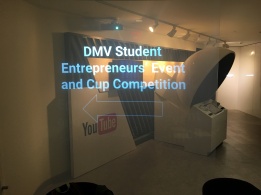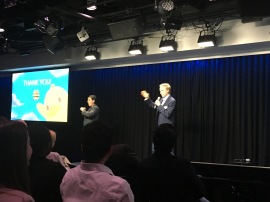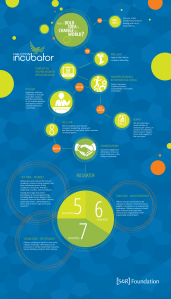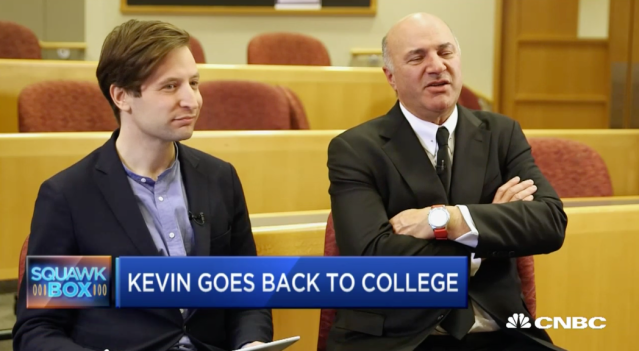Kevin O’Leary of Shark Tank visits Harvard Business School and offers a few nuggets of truth. Kevin also listens to pitches from some of the student founders. While Kevin recognizes the advantages of launching at Harvard University, he does not realize how much schools like George Mason University, University of Chicago and others are doing to provide real opportunities to experience entrepreneurship and innovation on campus — now.
Category: Entrepreneurship Education
FT Rankings – Sneak Peak at Entrepreneurship
The Financial Times will release its 2018 MBA programme rankings at the end of January; they’ve provided a tease on entrepreneurship education (which Stanford University has dominated since this sub ranking began in 2015). From the FT.
Stanford Graduate School of Business has topped the table since 2015. Latest data show that slightly more than a third (36 per cent) of its alumni started a company during orPlease use the sharing tools found via the email icon at the top of articles.
Alumni from Olin Graduate School of Business at Babson College (ranked third for entrepreneurship) had the highest proportion — with 52 per cent of its graduates setting up a company.
But overall, appetite for start-up creation seems to have peaked in 2015 when it reached 21 per cent. This was up from 18 per cent in 2013 and 2014. It fell back to 19 per cent in 2016 and 2017. Are start-ups on a downward trend or will they bounce back in 2018?after graduation.
DMV 100 Student Meetup | SkyFarm Interactive | #studentfounders
We attended an amazing meetup and student pitch event on Thursday March 30 at the  Google offices in DC near Union Station — the 100 student DMV meetup. There were students from Georgetown, American University, George Washington University, Catholic University, Gallaudet University, the University of Maryland, George Mason University, Johns Hopkins University, Howard University and the University of the District of Columbia.
Google offices in DC near Union Station — the 100 student DMV meetup. There were students from Georgetown, American University, George Washington University, Catholic University, Gallaudet University, the University of Maryland, George Mason University, Johns Hopkins University, Howard University and the University of the District of Columbia.
Our colleagues at AU and GWU did the heavy lifting in organizing this meetup and pitch event, as did our hosts from the Google Policy Office.
Eight student ventures from 8 different schools pitched a range of new ventures — from a convenient,  ‘on-the-go’ makeup kit to solar energy in Africa — problems were identified, solutions offered, and market sizes assessed. There was energy and passion in the room and it highlighted how active today’s students are and how responsive our best universities are to the demands of students and the entrepreneurial economy.
‘on-the-go’ makeup kit to solar energy in Africa — problems were identified, solutions offered, and market sizes assessed. There was energy and passion in the room and it highlighted how active today’s students are and how responsive our best universities are to the demands of students and the entrepreneurial economy.
David Martell, a finance student at Mason presented his firm, SkyFarm Interactive, and his vision of a new family friendly digital world — a Disney for today and tomorrow. SkyFarm Interactive, and its main character, Duncan the Silly Duck, can be found in the iTunes sticker store!
The Campus as Entrepreneurial Ecosystem
I am in the midst of writing a paper that explores the campus as an entrepreneurial ecosystem. Much of the preliminary work, thinking, and formation of this idea took place while I completed my PhD. Here is the work in all its glory: Campus as Frontier: High Growth Student Startups at US College and Universities.
And here is a snippet regarding looking beyond PhD and lab science for innovators on campus:
Policy makers should consider Jefferson’s radical idea of offering choice for undergraduates in 1819 or Van Hise’s plan to provide educational resources to fishermen in Minocqua, Wisconsin as well as researchers in Madison at the main campus of University of Wisconsin. In both historical examples, leaders attempted to bring the assets and opportunities of the universities to individuals, allowing them to make the university work for them and their problems.
The challenge for policymakers is to craft policies and structures supporting small scale projects by non-research oriented innovators such as MBA candidates and undergraduate music majors, instead of targeting their attention and resources on faculty winning federal grants. There is no doubt that Vannevar Bush’s shadow is long and wide and emerging from it will take concerted efforts for university and policy leaders.
Yes, I am arguing that University leaders and policy makers are looking in the wrong places for innovation and entrepreneurship on campus — chasing lab led science and big ‘innovation’ building projects such as tech centers or innovation zones (always funded with ‘public’ money) instead of the bottom up innovation and entrepreneurship that my dissertation uncovers.
Any thoughts or feedback or criticism?
UK Science Calls for Support of Undergrad Founders and Entrepreneurship Education
While it has a decidedly scientific bent to it, the Council for Science and Technology (a UK government agency) has sent a letter to Prime Minister at 10 Downing St. arguing for more improving entrepreneurship education.
The letter, with a direct nod to MIT, is signed by Sir Mark Walport and Professor Dame Nancy Rothwell, and can be found here.
Prime Minister Theresa May has responded here.
For my take on the campus ecosystem.
Some @PeterThiel Content | Videos and Articles
Like many, I’ve been fascinated by Peter Thiel for a few years, really hitting my radar with his Thiel Fellowship a few years back when he asked innovators to leave the campus and pursue their innovations (here are all the fellowship winners). I was fortunate enough to  see him in Conversations with Tyler at George Mason University in 2015.
see him in Conversations with Tyler at George Mason University in 2015.
His background, from founding PayPal (PYPL | NASDAQ) and funding Facebook (FB | NASDAQ) to his fellows and Zero to One (his book), its clear this guy is one of the most intelligent and insightful people out there (at least among those sharing their thoughts publicly) so it’s no surprise that he has been so successful. Here is some Thiel content.
I share the The Competition Myth by Peter Thiel with all of my students.
Excellent long video interview with Bill Kristol. Really covers a diverse set of topics from Facebook to the major problems with higher education – really going after the ‘racket’ of higher ed with some incredible truths (last 25 minutes or so). Really great long interview (I watched it over 5 sessions)
Video of Peter Thiel discussing Mark Zuckerberg’s impact in specifics. Good short video (6:30).
Well? Pretty thoughtful, insightful guy huh? Feel free to send any great Thiel content you come across.
BTW, interested on my views of higher education, founders and innovation? Check out Campus Frontier: High Growth Student Startups at US Colleges and Universities.
Books for Innovators and Entrepreneurs | #Sprintbook #CleanDisruption
I started reading Tony Seba‘s Clean Disruption of Energy and Transportation — I decided to read more books in 2016, now that the Phd on student entrepreneurs is done.
A few weeks ago while in Tokyo I heard Tony speak and spent some time with him after his talk. While I’ve followed solar, Tesla, and the like from a distance, the deep dive with Tony and his book has converted me.
With detailed statistics and crucial discussions of new disruptive business models, Tony presents a vivid potential picture of the near future. Speed and scale of change will rival anything we’ve seen in recent years. The ramifications of this change are massive — could keep you up for days on end thinking about the end of oil and all that will entail — just let your mind go for a moment. Check out Clean Disruption — at least download the first chapter or watch some of Tony’s videos.
The other book I am quickly reading is Sprint: How to Solve Big Problems and Test New Ideas in Just 5 Days. Its comes from key team members at Google Ventures — Jake Knapp, John Zeratsky, Braden Kowitz. While I’ve just started it, its clear it fits in the lean startup,  startup weekend, hackathon, design thinking, maker revolution that we are witnessing. And to be honest, how could anyone interested in innovation and problem solving, not want to learn some of the frameworks, techniques etc employed by Google / Alphabet (GOOG | Nasdaq)
startup weekend, hackathon, design thinking, maker revolution that we are witnessing. And to be honest, how could anyone interested in innovation and problem solving, not want to learn some of the frameworks, techniques etc employed by Google / Alphabet (GOOG | Nasdaq)
The notion/ethos that action, experimentation, questions, and speed truly matter in effective problem solving, innovation and entrepreneurship is where we are. (As a side note — this is going to cause increasingly dramatic problems for higher education in the coming years)
Sprint, from the get go, includes nice graphics and appears to be a clear, detailed map for mere mortals to follow. The challenge for most of us will likely be brain power, commitment, courage, resources, and collaborators. But I look forward to experimenting with this roadmap with our innovators at Mason and others. Will update more when I get deeper into this one, but it looks like it could be a nice starting point to play with and explore in the coming months.
Here are some reviews of Sprint by Jake Knapp, John Zeratsky and Braden Kowitz:
Goodreads and Upstart and Financial Times (what never read it — then please do acquaint yourself with the FT)
Visit to Halcyon Incubator | #SOCENT #Incubator #DC
Earlier this week I was fortunate to tour Halcyon Incubator in the Georgetown neighborhood of DC. The year long social entrepreneurship incubator, offers 8 early stage social entrepreneurs the opportunity to live and work in the Halcyon  House (a bit more on the property later).
House (a bit more on the property later).
For the first 5 months the entrepreneurs participate in the ‘residency’ phase with skills sessions, pitch opportunities, weekly lunches, mentors, consultants and others supporting their ventures development. For the next 7 months the entrepreneurs live and work in the Halcyon House — a gorgeous, amazingly decorated mansion in Georgetown (virtual tour) with everything from a ballroom to beautiful grounds with a pool.
The newest cohort of Halcyon Fellows are just moving in and beginning their year in the program. They are a diverse lot solving important problems and I look forward to meeting some of them and watching their progress over the next year.
The deadline to apply for the next cohort of fellows is October 14, 2015. If you are an early stage social entrepreneur please check this program out. If you know an emerging social entrepreneur, share the application with them.

Tina Seelig of Stanford on Why It’s Imperative to Entrepreneurship
Paul Rogers tweeted a great piece by Tina Seelig at Medium: Why It’s Imperative to Teach Entrepreneurship. Its short and to the point and worth reading and sharing.
Our education system is responsible for preparing young people to build successful lives. They should be ready for the wide range of possibilities ahead of them, including working for others, starting their own ventures, and contributing to their communities. All of these options require a depth of knowledge in their chosen discipline, as well as creative problem solving skills, leadership abilities, experience working on effective teams, and adaptability in an ever-changing environment. It’s no coincidence that these are the same capabilities that employers say they want in college graduates.
These skills are the cornerstones of entrepreneurship education, which explicitly prepares students to identify and address challenges and opportunities. Therefore, along with teaching traditional subjects, such as science, grammar, and history, that provide foundational knowledge, it’s imperative that we teach students to be entrepreneurial.

